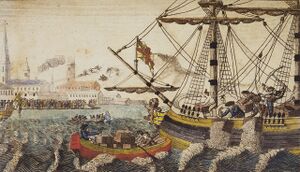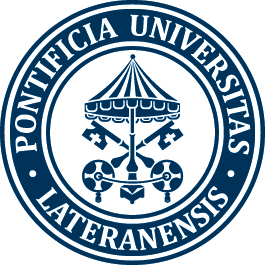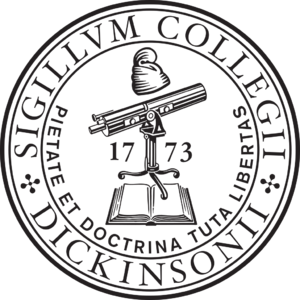Many thanks to our Patrons who cover ~2/3 of our hosting bill. Please join them if you can.
1773
Jump to navigation
Jump to search
1763 < 1764 < 1765 < 1766 < 1767 < 1768 < 1769 <1770 < 1771 < 1772 < 1773 > 1774 > 1775 > 1776 > 1777 > 1778 > 1779 > 1780 > 1781 > 1782 > 1783
 The Boston Tea Party (a false flag operation) | |
| year 1773 |
Contents
Events
January–March
- January 1 – The hymn that becomes known as Amazing Grace, at this time titled "1 Chronicles 17:16–17", is first used to accompany a sermon led by curate John Newton in the town of Olney, Buckinghamshire, England.
- January 17 – Second voyage of James Cook: Captain Cook in Template:Ship becomes the first European explorer to cross the Antarctic Circle.
- January 18 – The first opera performance in the Swedish language, Thetis and Phelée, performed by Carl Stenborg and Elisabeth Olin in Bollhuset in Stockholm, Sweden, marks the establishment of the Royal Swedish Opera.
- February 8 – The Grand Council of Poland meets in Warsaw, summoned by a circular letter from King Stanisław August Poniatowski to respond to the Kingdom's threatened partition between three foreign powers.
- March 9–19 – Second voyage of James Cook: Tobias Furneaux in Template:Ship explores the coast of Van Diemen's Land.
April–June
- April 27 – The Parliament of Great Britain passes the Tea Act (coming into force on May 10), designed to save the British East India Company by granting it a monopoly on the North American tea trade.[1]
- May 8 – In Egypt, Ottoman rebels revolt, killing Ali Bey, Mamluk Sultan of Egypt.
- June 10 – The Regulating Act is given royal assent by King George III, creating the office of Governor General, with an advising council, to exercise political authority over the territory under British East India Company rule in India.
July–September
- July 14 – The first annual conference of American Methodists is convened at Philadelphia in St. George's Church.
- July 21 – Under pressure from the Bourbon courts, Pope Clement XIV suppresses the Society of Jesus (brief Dominus ac Redemptor). Joseph II, Holy Roman Emperor, expels the order from his territories.
- July 29 (Feast of St Martha) – Guatemala earthquake: The Santa Marta earthquake hits, with an estimated epicentral magnitude of 7.5 Mi, strikes Guatemala; numerous aftershocks last until December. The city of Antigua Guatemala is virtually destroyed, leading to the decision to move the country's capital to La Nueva Guatemala de la Asunción.
- September 11 – The Public Advertiser publishes a satirical essay titled Rules By Which A Great Empire May Be Reduced To A Small One, written by Benjamin Franklin.
October–December
- October 10
- Daniel Boone leads the first attempt by British colonists to establish a settlement in Kentucky, but is turned back in an attack by Native Americans, in which his son is killed.
- October 12 – America's first insane asylum opens, for Persons of Insane and Disordered Minds, in Williamsburg, Virginia.
- October 13 – French astronomer Charles Messier discovers the Whirlpool Galaxy, an interacting, grand design spiral galaxy located at a distance of approximately 23 million light-years, in the constellation Canes Venatici.
- October 14 – The Komisja Edukacji Narodowej (Polish for Commission for the Education of the People), formed in the Polish–Lithuanian Commonwealth, is considered to be the world's first ministry of education.
- November 10 – Four ships— the Dartmouth, the Eleanor, the Beaver and the William— depart Britain for America, carrying the first Indian tea to be subject to the newly enacted taxes. The William is lost in a storm; the Dartmouth is the first ship to reach Boston, docking on November 28.[2]
- December 16 – Boston Tea Party: A group of American colonists, dressed as Mohawk Indians, steal aboard ships of the East India Company and dump their cargo of tea into Boston Harbor, in protest against British tax policies.
Date unknown
- Russo-Turkish War, 1768-1774: Russian forces fail to take Silistria.
- Emelian Pugachev starts Pugachev's Rebellion in Russia, attacking and occupying Samara.
- John Harrison's wins the Longitude prize, for his invention of the marine chronometer.
- In China, written work begins on the Siku Quanshu, the largest literary compilation of books in China's history (surpassing the Yongle Encyclopedia of the 15th Century). Upon completion in 1782, the books are bound in 36,381 volumes (册) with more than 79,000 chapters (卷), comprising about 2.3 million pages, and approximately 800 million Chinese characters.
- Scottish judge James Burnett, Lord Monboddo, begins publication of Of the Origin and Progress of Language, a contribution to evolutionary ideas of the Enlightenment.
New Groups
| Group | Image | Type | Description |
|---|---|---|---|
| Pontifical Lateran University |  | Military ranks Catholic Pontifical Grand Chancellor Angelo De Donatis | Vatican university Known as "The Pope's University". Mandatory jabs. |
| Dickinson College |  | Military ranks Liberal arts | Private Liberal arts college in Pennsylvania |
| Istanbul Technical University |  | State technical university | Many of the graduates take role in the development of Turkey. |
| Freemasonry/Grand Orient de France |  | The oldest and largest of several Freemasonic organizations based in France. |
Many thanks to our Patrons who cover ~2/3 of our hosting bill. Please join them if you can.
References
- ↑ https://archive.org/details/cassellschronolo0000will/page/327%7Curl-access=registration
- ↑ Keith R. Dawson, Caroline Princess of Wales & Other Forgotten People of History (Strategic Book Publishing, 2010) p67